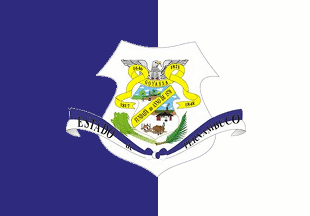 image by Dirk Schönberger, 5 May 2011
image by Dirk Schönberger, 5 May 2011Source: http://pt.wikipedia.org/wiki/Goiana

Last modified: 2012-03-23 by ian macdonald
Keywords: pernambuco | goiana |
Links: FOTW homepage |
search |
disclaimer and copyright |
write us |
mirrors
 image by Dirk Schönberger, 5 May 2011
image by Dirk Schönberger, 5 May 2011
Source:
http://pt.wikipedia.org/wiki/Goiana
A vertical bicolor, blue and white, with the municipal arms centerd.
Official website at
http://www.goiana.pe.gov.br
Dirk Schönberger, 5 May 2011
The municipality of Goiana (75,987 inhabitants in 2011; 151 sq. km) is
located in northeastern Pernambuco, on the border with Paraíba, 60 km of Recife
and 50 km of João Pessoa. The municipality is made of the town of
Goiana proper and of the districts of Pontas de Pedras and Tejucopapo.
Goiana was mentioned for the first time, as Gueena, in a record of the
Society of Jesus dated 1592. A similar record, dated 1606, mentions "Goyana",
subsequently changed to "Goyanna" and, eventually, to Goiana. The most
probable origin of the name of the town is a Tupi-Guarani word meaning "The
Land rich in water". The early settlement was made a commune when Diogo Fias
a rich colonist, purchased from Jerônima de Albuquerque Sousa a piece of land
and established a fortified mill in the valley of River Tracunhaém. In 1574,
the Potiguara Indians destroyed the mill, which caused the suppression of the
Itamaracá Capitanate, replaced by the Paraíba Capitanate. In the colonial
period, Goiana was the main producer of sugarcane in Pernambuco. Sugar was
exported from the port set up on river Goiana. In January 1640, a naval
battle opposed between Goiana and the Itamaracá island the fleets of Fernando
de Mascarenhas, Count of Torre, and of William Corneliszoon; four engravings
by Frans Post recall the battle. On 24 April 1646, the women from the village
of Tejucopapo, equipped with stones, tools and hot water, repelled the
Dutch who threatened the village. The "Epics of the Tejucupapo Heroines" is
celebrated every last Sunday of April. The inhabitants of Goiana proudly
contributed to several revolutionary events, such as the Pernambuco
Revolution (1817), the Ecuadorian Confederation (1824) and the Goiana
Revolution (1825). Goiana was made a "vila" on 15 January 1685, a "cidade" on
5 May 1840, and the seat of a municipality on 3 August 1892. Goiana was
incorporated to the Recife Metropolitan Area on 23 March 2007.
The coat
of arms of Goaina depicts the Japumim mill, which may be the first place
settled in the municipality, and the Sugar Mill. The two scenes are separated
by a yellow bend sinister inscribed "FUNDADA no ANNO DE 1570" (Founded in
year 1570). The shield is surmounted by an eagle argent holding a yellow
scroll inscribed "1646", "1821", "GOYANNA", "1848" and "1888". Below the
shield is placed a scroll horizontally divided blue-white and inscribed
"ESTADO de PERNAMBUCO".
http://www.goiana.pe.gov.br/index.php?sec=brasao
Ivan Sache, 5 March 2012